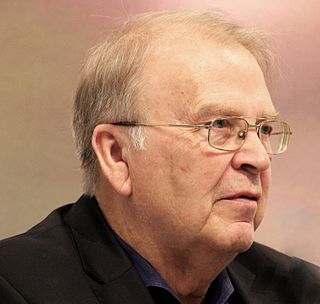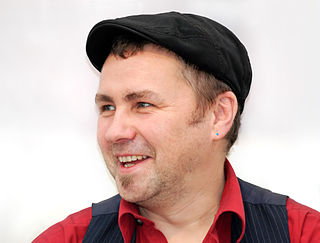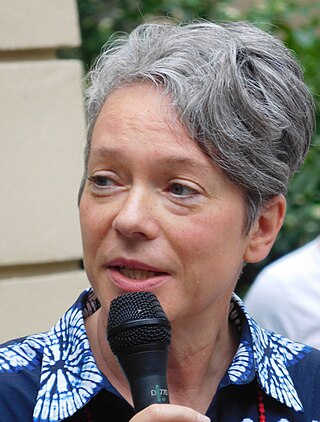Related Research Articles

Martin Johannes Walser was a German writer, especially known as a novelist. He began his career as journalist for Süddeutscher Rundfunk, where he wrote and directed audio plays. He was part of Group 47 from 1953.

Claudio Magris is an Italian scholar, translator and writer. He was a senator for Friuli-Venezia Giulia from 1994 to 1996.
Thomas Hürlimann is a Swiss playwright and novelist.

Wilhelm Genazino was a German journalist and author. He worked first as a journalist for the satirical magazine pardon and for Lesezeichen. From the early 1970s, he was a freelance writer who became known by a trilogy of novels, Abschaffel-Trilogie, completed in 1979. It was followed by more novels and two plays. Among his many awards is the prestigious Georg Büchner Prize.

Katharina Thalbach is a German actress and stage director. She played theatre at the Berliner Ensemble and at the Volksbühne Berlin, and was actress in the film The Tin Drum. She worked as a theatre and opera director.

Friederike Mayröcker was an Austrian writer of poetry and prose, radio plays, children's books and dramatic texts. She experimented with language, and was regarded as an avantgarde poet, and as one of the leading authors in German. Her work, inspired by art, music, literature and everyday life, appeared as "novel and also dense text formations, often described as 'magical'." According to The New York Times, her work was "formally inventive, much of it exploiting the imaginative potential of language to capture the minutiae of daily life, the natural world, love and grief".

Martin Jankowski is a German writer and poet.

Terézia Mora is a German Hungarian writer, screenwriter and translator.

Josef Haslinger is an Austrian writer.
The Alfred Kerr Preis for literary criticism is an annual award funded by the journal of the German Book Trade.

Brigitte Kronauer was a German writer who lived in Hamburg. Her novels, written in the tradition of Jean Paul with artful writing and an ironic undertone, were awarded several prizes, including in 2005 the Georg Büchner Prize, in 2011 the Jean-Paul-Preis and in 2017 the Thomas Mann Prize.

Reinhard Jirgl is a German writer.

Iris Hanika is a German writer. She was born in Würzburg, grew up in Bad Königshofen and has lived in Berlin since 1979, where she studied Universal and Comparative Literature at the FU Berlin. She was a regular contributor to German periodicals like Frankfurter Allgemeine Zeitung and Merkur. Hanika won the LiteraTour Nord prize and the EU Prize for Literature for her novel Das Eigentliche. In 2020, she was awarded the Hermann-Hesse-Literaturpreis for her novel Echos Kammern. In 2021, she won the Leipzig Book Fair Prize. Hanika wrote previously mainly short non-fictional texts, later novels, including two books on psychoanalysis.

Ulrike Draesner is a German author. She was awarded the 2016 Nicolas Born Prize.

Klaus Modick is a German author and literary translator.

Ina Hartwig is a German writer, literature critic and academic lecturer. From July 2016, she has been Kulturdezernentin in Frankfurt, the city councillor responsible for culture and science.

Ilma Rakusa is a Swiss writer and translator. She translates French, Russian, Serbo-Croatian and Hungarian into German.

Natascha Wodin is a German writer of Ukrainian origin. She was born in Fürth, Bavaria in 1945 to parents who had been forced labourers under the Nazi regime. She grew up in a camp for displaced persons. Following her mother's suicide, she was raised in a Catholic home for girls. She worked as a telephone operator and stenographer before becoming an interpreter and translator of Russian in the early 1970s.

Theresa Hannig is a German science fiction author.

Ulrike Almut Sandig is a German writer. She was born in Großenhain in the former GDR, and has lived in Riesa, Leipzig and Berlin. She studied religion and indology at university, and then studied at the German Institute for Literature in Leipzig.
References
- ↑ "SERAPH – Phantastische Akademie e. V."
- ↑ TheTolkienist (24 January 2015). "On my own behalf: The Tolkienist named jury member with two German fantasy awards".
- ↑ "Urlaub in fremden Welten". www.leipziger-buchmesse.de.[ dead link ]
- ↑ "Preis für phantastische Literatur / Die Shortlists des Seraph 2016 stehen". www.boersenblatt.net.
- ↑ "Jury – Phantastische Akademie e. V."
- ↑ "Preisträger – Phantastische Akademie e. V."
- ↑ "Katharina Seck und Julia Lange gewinnen den Phantastischen Literaturpreis Seraph". buchreport. 24 March 2017.
- ↑ "Seraph 2019 / Bernhard Hennen erhält den Phantastikpreis". www.boersenblatt.net.
- ↑ "Verleihung des SERAPH 2020". www.hallespektrum.de.